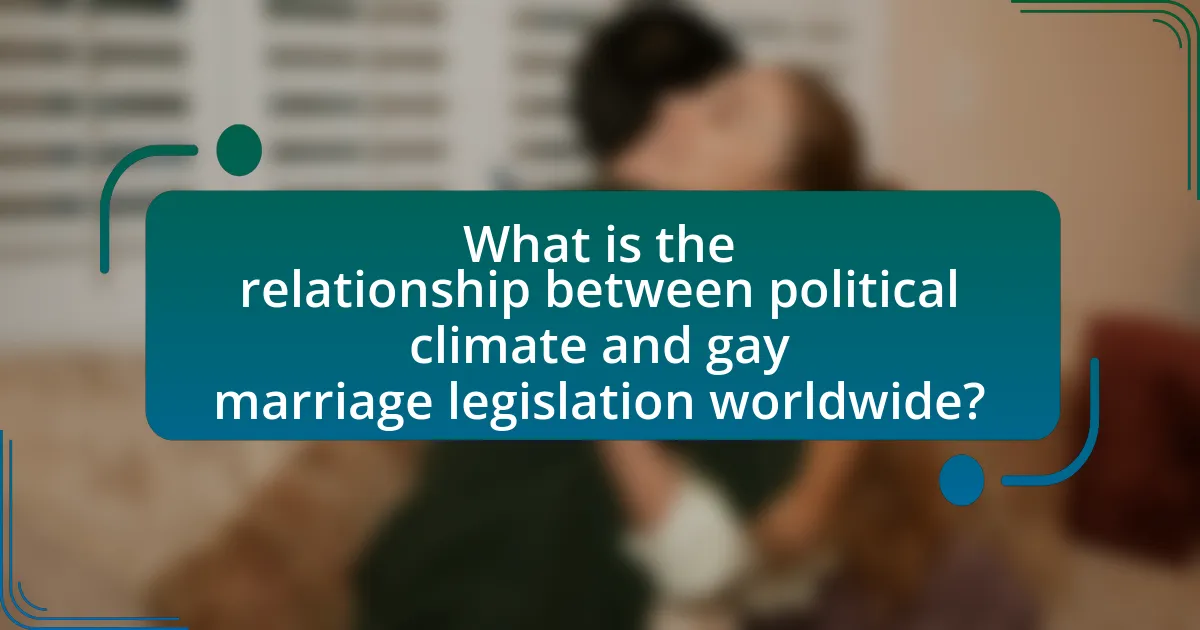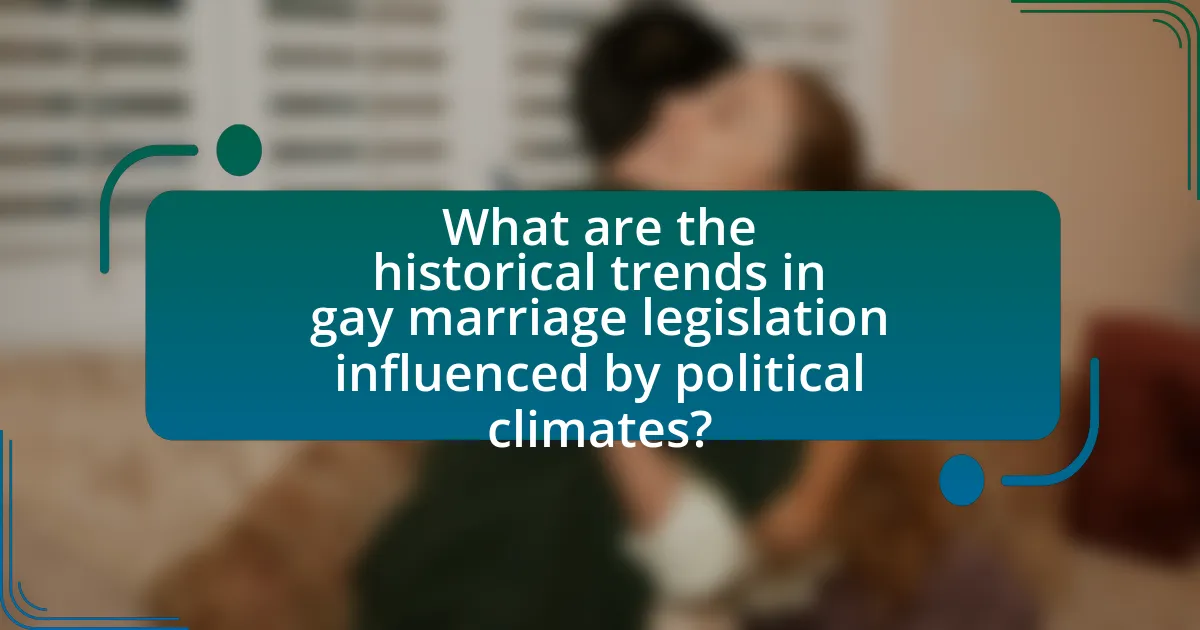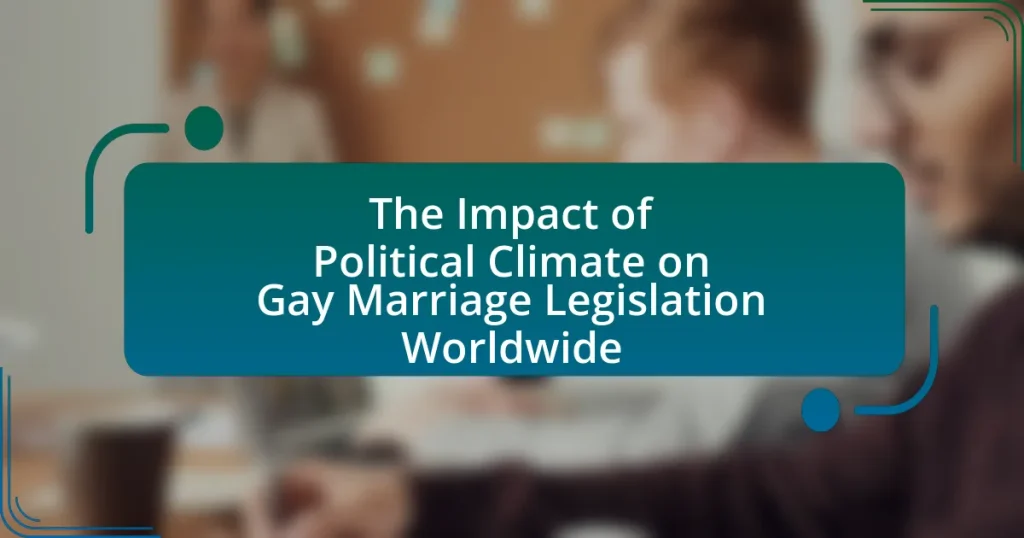The article examines the significant relationship between political climate and gay marriage legislation worldwide, highlighting how political attitudes shape the legal status of same-sex marriage. It discusses the influence of progressive versus conservative political environments on public opinion, legislative actions, and judicial decisions regarding LGBTQ+ rights. Key factors contributing to a supportive political climate for gay marriage include public opinion, political leadership, and existing legal frameworks. The article also explores the impact of international relations, treaties, and historical trends on the evolution of gay marriage laws, as well as the challenges faced in various political contexts. Additionally, it addresses the role of grassroots activism and international support in advancing marriage equality amid political opposition.

What is the relationship between political climate and gay marriage legislation worldwide?
The relationship between political climate and gay marriage legislation worldwide is significant, as political attitudes directly influence the legal status of same-sex marriage. In countries with progressive political environments, such as Canada and many Western European nations, legislation supporting gay marriage has been enacted, reflecting broader societal acceptance and advocacy for LGBTQ+ rights. Conversely, in nations with conservative political climates, such as many in Africa and the Middle East, laws often prohibit same-sex marriage, driven by traditional values and political resistance to LGBTQ+ rights. For example, as of 2023, 34 countries have legalized same-sex marriage, primarily in regions where political support aligns with public opinion favoring equality, while over 70 countries still criminalize homosexuality, indicating a direct correlation between political governance and the advancement or restriction of gay marriage legislation.
How does political climate influence the acceptance of gay marriage?
The political climate significantly influences the acceptance of gay marriage by shaping public opinion, legislative actions, and judicial decisions. In countries where political leaders advocate for LGBTQ+ rights, such as in Canada and many Western European nations, public acceptance tends to be higher, leading to the legalization of gay marriage. For instance, a 2019 Pew Research Center survey indicated that in countries with supportive political environments, over 70% of the population favored same-sex marriage. Conversely, in nations with conservative political climates, such as in parts of Eastern Europe and Africa, opposition to gay marriage remains strong, often resulting in restrictive laws and social stigma. This correlation between political leadership and societal attitudes underscores the critical role that the political climate plays in the progression of gay marriage acceptance globally.
What factors contribute to a supportive political climate for gay marriage?
A supportive political climate for gay marriage is primarily influenced by public opinion, political leadership, and legal frameworks. Public opinion plays a crucial role, as increased acceptance of LGBTQ+ rights among the general population often leads to political pressure on lawmakers to support gay marriage legislation. For instance, a 2021 Gallup poll indicated that 70% of Americans supported same-sex marriage, reflecting a significant shift in societal attitudes over the past two decades.
Political leadership is another key factor; elected officials who advocate for LGBTQ+ rights can drive legislative change. Countries like Canada and Germany have seen progressive leaders championing gay marriage, resulting in successful legalization efforts.
Additionally, existing legal frameworks that protect against discrimination and promote equality can create an environment conducive to the acceptance of gay marriage. For example, nations with comprehensive anti-discrimination laws often experience smoother pathways to legalizing same-sex marriage, as these laws establish a foundation for equality.
Together, these factors create a political climate that is more likely to support and enact gay marriage legislation.
How do political parties’ ideologies affect gay marriage legislation?
Political parties’ ideologies significantly influence gay marriage legislation, as parties with progressive ideologies typically advocate for LGBTQ+ rights, including marriage equality, while conservative parties often oppose such measures. For instance, in the United States, the Democratic Party has historically supported gay marriage, culminating in the Supreme Court’s 2015 ruling in Obergefell v. Hodges, which legalized same-sex marriage nationwide. Conversely, many Republican leaders have opposed gay marriage, reflecting their party’s traditional values. This ideological divide shapes legislative agendas, public policy, and the overall acceptance of gay marriage within different political contexts globally.
What role do international relations play in shaping gay marriage laws?
International relations significantly influence the development of gay marriage laws by fostering diplomatic pressure and promoting human rights standards. Countries that prioritize LGBTQ+ rights often leverage their international standing to encourage other nations to adopt similar laws, as seen in the European Union’s emphasis on human rights compliance for member states. For instance, nations like the Netherlands, which legalized gay marriage in 2001, have set a precedent that has inspired other countries to follow suit, often under the influence of international organizations advocating for equality. Additionally, international treaties and agreements, such as the Yogyakarta Principles, provide frameworks that encourage nations to align their domestic laws with global human rights norms, thereby shaping the legal landscape for gay marriage.
How do treaties and agreements impact domestic gay marriage legislation?
Treaties and agreements can significantly influence domestic gay marriage legislation by establishing international norms and legal frameworks that countries may adopt. For instance, treaties such as the European Convention on Human Rights have prompted member states to align their domestic laws with human rights standards, including the recognition of same-sex marriage. Additionally, agreements like the Yogyakarta Principles advocate for the protection of sexual orientation and gender identity, encouraging nations to enact laws that support marriage equality. These international commitments can create pressure on governments to reform their domestic legislation to comply with global human rights expectations, thereby facilitating the advancement of gay marriage rights.
What examples illustrate the influence of international pressure on gay marriage laws?
International pressure has significantly influenced gay marriage laws in various countries, with notable examples including the Netherlands and Taiwan. The Netherlands became the first country to legalize same-sex marriage in 2001, partly due to advocacy from international human rights organizations and the European Union, which emphasized the importance of equality and non-discrimination. Similarly, Taiwan’s Constitutional Court ruled in 2017 that same-sex marriage must be legalized, a decision influenced by international human rights standards and pressure from global LGBTQ+ advocacy groups, leading to the legalization of same-sex marriage in 2019. These instances demonstrate how international norms and advocacy can shape domestic legislation on gay marriage.

What are the historical trends in gay marriage legislation influenced by political climates?
Historical trends in gay marriage legislation show a significant correlation with political climates, particularly in the United States and various Western countries. For instance, the legalization of same-sex marriage in the Netherlands in 2001 marked a pivotal moment, influenced by a progressive political environment. Following this, many countries, including Canada in 2005 and Spain in 2005, enacted similar laws during periods of liberal governance. Conversely, in the U.S., the Defense of Marriage Act (DOMA) was enacted in 1996 under a conservative administration, reflecting a political climate resistant to same-sex marriage. The trend shifted dramatically after the 2008 election of President Barack Obama, who supported marriage equality, culminating in the Supreme Court’s 2015 ruling in Obergefell v. Hodges, which legalized same-sex marriage nationwide. This ruling was influenced by a growing acceptance of LGBTQ+ rights within the political discourse. Overall, the trajectory of gay marriage legislation has been closely tied to the prevailing political ideologies, with liberal administrations typically fostering more inclusive policies.
How have political movements shaped the evolution of gay marriage laws?
Political movements have significantly influenced the evolution of gay marriage laws by advocating for LGBTQ+ rights and mobilizing public support. For instance, the Stonewall Riots in 1969 marked a pivotal moment that galvanized activism, leading to increased visibility and demands for equality. This activism resulted in legal changes, such as the legalization of same-sex marriage in Massachusetts in 2004, which set a precedent for other states. Additionally, organizations like the Human Rights Campaign have played crucial roles in lobbying for legislative changes and influencing public opinion, contributing to the Supreme Court’s landmark decision in Obergefell v. Hodges in 2015, which legalized same-sex marriage nationwide in the United States. These movements have created a political climate that supports the recognition of gay marriage as a civil right, reflecting broader societal shifts towards acceptance and equality.
What significant milestones mark the progress of gay marriage legislation?
The significant milestones marking the progress of gay marriage legislation include the decriminalization of homosexuality in various countries, the legalization of same-sex marriage in specific jurisdictions, and landmark court rulings. For instance, the Netherlands became the first country to legalize same-sex marriage in 2001, setting a precedent for others. In the United States, the Supreme Court’s decision in Obergefell v. Hodges in 2015 established the constitutional right to same-sex marriage nationwide, significantly impacting the legal landscape. Additionally, countries like Canada and Spain legalized same-sex marriage in the mid-2000s, reflecting changing political climates and societal acceptance. These milestones demonstrate the evolving legal recognition of same-sex relationships globally.
How have landmark court cases influenced political attitudes towards gay marriage?
Landmark court cases have significantly influenced political attitudes towards gay marriage by establishing legal precedents that challenge discriminatory practices and promote equality. For instance, the 2015 Supreme Court case Obergefell v. Hodges legalized same-sex marriage nationwide, which shifted public opinion and encouraged political leaders to support LGBTQ+ rights. Following this ruling, polls indicated increased acceptance of gay marriage among the general population, with support rising from 40% in 2009 to over 60% by 2021. This legal affirmation has prompted many politicians to align their platforms with the evolving societal norms, leading to more inclusive policies and legislation.
What are the differences in gay marriage legislation across various political systems?
Gay marriage legislation varies significantly across political systems, reflecting differing cultural, legal, and political contexts. In democratic nations like Canada and the Netherlands, same-sex marriage is legally recognized, with Canada legalizing it nationwide in 2005 and the Netherlands being the first country to do so in 2001. Conversely, in authoritarian regimes such as Russia and many Middle Eastern countries, same-sex marriage is prohibited, and LGBTQ+ rights are severely restricted, with Russia enacting a federal law against “propaganda of non-traditional sexual relationships” in 2013. Additionally, in countries with mixed political systems, such as the United States, the legality of gay marriage varies by state; it was federally recognized in 2015 through the Supreme Court ruling in Obergefell v. Hodges, but some states have attempted to pass laws undermining this recognition. These differences illustrate how political climate directly influences the acceptance and legal status of gay marriage worldwide.
How do democratic and authoritarian regimes differ in their approach to gay marriage?
Democratic regimes generally support the legalization of gay marriage, while authoritarian regimes often oppose it. In democracies, public opinion and advocacy groups can influence legislation, leading to the recognition of same-sex marriage rights, as seen in countries like the United States and Canada, where legal frameworks have evolved to support LGBTQ+ rights. In contrast, authoritarian regimes typically enforce traditional values and may criminalize homosexuality, as evidenced by countries like Russia and Uganda, where laws explicitly prohibit same-sex marriage and promote discrimination against LGBTQ+ individuals. This divergence reflects the broader political climate, where democratic values prioritize individual rights and freedoms, while authoritarian systems prioritize state control and social conformity.
What role does public opinion play in shaping legislation in different political contexts?
Public opinion significantly influences legislation across various political contexts by shaping policymakers’ decisions and priorities. In democratic systems, elected officials often respond to public sentiment to secure votes and maintain support, leading to the enactment of laws that reflect the majority’s views. For instance, in the United States, the increasing acceptance of same-sex marriage among the public, which rose from 27% support in 1996 to over 70% by 2021, directly contributed to the legalization of gay marriage nationwide through the Supreme Court ruling in Obergefell v. Hodges in 2015. Conversely, in authoritarian regimes, public opinion may be less influential due to limited political freedoms, but leaders may still gauge public sentiment to avoid unrest, as seen in countries where protests have prompted legislative changes. Thus, public opinion serves as a critical barometer for legislative action, varying in impact depending on the political environment.

What current challenges does gay marriage legislation face in different political climates?
Gay marriage legislation currently faces significant challenges that vary across different political climates. In conservative political environments, such as in parts of the United States and Eastern Europe, there is often strong opposition from religious groups and lawmakers, leading to restrictive laws or constitutional amendments that prohibit same-sex marriage. For instance, in Hungary, the government has enacted a constitutional amendment that defines marriage strictly as a union between a man and a woman, effectively barring same-sex marriage.
Conversely, in more progressive political climates, such as in Western Europe and parts of North America, while gay marriage is legally recognized, challenges persist in the form of social backlash and discrimination. For example, even in countries where same-sex marriage is legal, LGBTQ+ individuals may still face societal stigma and discrimination, which can hinder the full acceptance and implementation of marriage equality.
Additionally, the political climate can influence the judicial landscape, where courts may be less willing to uphold or expand rights for same-sex couples in conservative regions. This dynamic creates a patchwork of legal recognition and protections for gay marriage, reflecting the broader societal attitudes towards LGBTQ+ rights in various political contexts.
How do recent political changes affect the future of gay marriage legislation?
Recent political changes significantly influence the future of gay marriage legislation by shifting public policy and legislative priorities. For instance, the election of pro-LGBTQ+ candidates in various regions has led to the introduction of bills aimed at protecting and expanding marriage rights for same-sex couples. Additionally, the reversal of anti-LGBTQ+ policies, such as the repeal of discriminatory laws, further solidifies the legal framework supporting gay marriage. Historical data shows that in countries where progressive political parties gain power, there is a marked increase in the passage of gay marriage legislation, as seen in nations like Ireland and Taiwan, where public referendums and legislative actions have resulted in legal recognition of same-sex marriage.
What are the implications of rising conservatism on gay marriage rights?
Rising conservatism generally leads to increased opposition to gay marriage rights, resulting in potential legal restrictions and social stigmatization. For instance, in the United States, the resurgence of conservative political power has seen attempts to introduce legislation that undermines or rolls back protections for same-sex marriage, as evidenced by various state-level initiatives aimed at defining marriage strictly as a union between one man and one woman. Additionally, public opinion surveys indicate that in regions where conservatism is on the rise, support for gay marriage tends to decline, reflecting a broader cultural backlash against LGBTQ+ rights. This trend can lead to a chilling effect on advocacy efforts and may hinder progress toward equality in marriage legislation globally.
How do social movements respond to political opposition against gay marriage?
Social movements respond to political opposition against gay marriage by mobilizing grassroots activism, engaging in public education campaigns, and leveraging legal challenges. For instance, organizations like the Human Rights Campaign and GLAAD have organized protests and advocacy efforts to raise awareness and support for marriage equality, effectively countering anti-gay marriage legislation. Additionally, studies show that public opinion shifts in favor of gay marriage often follow sustained activism, as seen in the U.S. where support increased from 27% in 1996 to over 70% by 2021, reflecting the impact of these movements. Legal challenges, such as the landmark Supreme Court case Obergefell v. Hodges in 2015, demonstrate how social movements can successfully confront political opposition and achieve significant legal victories for marriage equality.
What strategies can advocates use to promote gay marriage legislation in challenging political climates?
Advocates can promote gay marriage legislation in challenging political climates by employing grassroots mobilization, strategic partnerships, and targeted messaging. Grassroots mobilization involves organizing community events and campaigns to raise awareness and build local support, which can influence public opinion and pressure lawmakers. Strategic partnerships with influential organizations, such as civil rights groups and businesses, can amplify advocacy efforts and provide additional resources. Targeted messaging that resonates with specific demographics, such as emphasizing family values or economic benefits, can help sway undecided voters and legislators. Historical examples, such as the successful campaigns in states like Massachusetts and California, demonstrate that these strategies can effectively shift political landscapes and lead to legislative change.
What role does grassroots activism play in influencing political change for gay marriage?
Grassroots activism plays a crucial role in influencing political change for gay marriage by mobilizing community support and raising awareness about LGBTQ+ rights. This form of activism often involves organizing protests, campaigns, and educational initiatives that directly engage the public and policymakers. For instance, the Human Rights Campaign reported that grassroots efforts significantly contributed to the legalization of same-sex marriage in various states, highlighting how local advocacy can shift public opinion and pressure legislators to act. Additionally, studies show that states with strong grassroots movements for gay marriage experienced faster legislative changes, demonstrating the effectiveness of community-driven efforts in achieving political goals.
How can international support aid local movements for gay marriage rights?
International support can significantly aid local movements for gay marriage rights by providing resources, advocacy, and visibility. For instance, financial assistance from international organizations can help local groups organize campaigns, conduct research, and engage in legal battles. Additionally, global advocacy can amplify local voices, drawing attention to their struggles and increasing pressure on governments to enact change. Historical examples include the role of international human rights organizations in supporting local activists during the legalization processes in countries like Argentina and Taiwan, where external advocacy helped shift public opinion and influence legislative outcomes.
What best practices can be adopted to navigate political climates for advancing gay marriage legislation?
To navigate political climates for advancing gay marriage legislation, advocacy groups should engage in strategic coalition-building with diverse stakeholders, including civil rights organizations, faith groups, and influential community leaders. This approach fosters a broad base of support, which is essential for influencing policymakers. For instance, the Human Rights Campaign successfully collaborated with various organizations to mobilize public opinion and legislative support during the push for marriage equality in the United States, culminating in the Supreme Court’s decision in Obergefell v. Hodges in 2015. Additionally, utilizing data-driven campaigns that highlight public support for gay marriage can effectively sway undecided legislators, as evidenced by numerous polls indicating that a majority of Americans support marriage equality.


